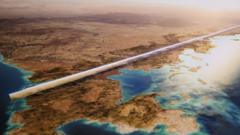2 hours ago
About sharing
Deputy Prime Minister Oliver Dowden meets with Saudi Arabian minister
Deputy Prime Minister Oliver Dowden has raised allegations with the Saudi government that its forces were “told to kill” for a futuristic city following a BBC investigation.
Neom’s The Line, the desert city, is one of the projects promoted at a UK-hosted event in Riyadh.
Mr Dowden is leading a 450-strong delegation on a trade mission to Saudi Arabia.
The UK said it has vital economic and national security interests there.
Speakers at the event include footballer Rio Ferdinand, former minister Jo Johnson and a British Airways executive.
Human rights groups have urged UK delegates to pressure Saudi leaders over the BBC’s exclusive investigation.
The “Great Futures” launch event taking place this week claims to “bring to life the sheer scale of opportunities for UK business in Saudi Arabia” and kickstarts a year-long partnership promoting trade, tourism, and education between the two countries.
The UK’s Cabinet Office posted photos of the deputy prime minister with Saudi leaders on X.
He was quoted as saying that “Britain doesn’t just endorse Saudi Arabia’s Vision 2030, we want to be a part of it”.
Asked about the BBC’s report, the prime minister’s official spokesman confirmed that Mr Dowden had “raised the issue of the treatment of villagers in the construction of the Neom project in his bilateral meetings while he has been out on this visit.”
He added that the UK had vital economic and national security interests with Saudi Arabia, but that “no aspect of our relationship prevents us from speaking frankly to them about these sorts of issues”.
Neom is one major part of Saudi’s Vision 2030 strategy which aims to diversify the kingdom’s economy away from oil.
Images of Neom’s The Line, a mirrored city in the desert, are central to the Department for Business and Trade’s website advertising the event.
Last week, an ex-intelligence officer, Colonel Rabih Alenezi, told the BBC that he was ordered to evict villagers from a tribe in the Gulf state to make way for The Line, part of the Neom eco-project.
One of them was subsequently shot and killed for protesting against eviction. A statement issued by Saudi state security at the time alleged that he had opened fire on security forces and they had been forced to retaliate. Human rights organisations and the UN have said he was killed simply for resisting eviction.
At least 47 other villagers were detained after resisting evictions, many of whom were prosecuted on terror-related charges, according to the UN and the UK-based human rights group ALQST. Of those, 40 remain in detention, five of whom are on death row, ALQST says.
The Saudi government and Neom management refused to comment on the findings of the BBC investigation.
Amnesty International, a human rights organisation, said: “The reality behind such futuristic projects is the brutal repression of citizens and residents.”
“Any business that knowingly contributes to human rights harms is in clear violation of international law,” Dana Ahmed, Amnesty International’s Middle East Researcher said.
ALQST said it appears that the UK is “increasingly willing to turn a blind eye to the catalogue of Saudi abuses on the ground.”
“Imagine if companies working on Neom made their involvement conditional on the release of local residents arrested for protesting forced eviction?” said Josh Cooper, deputy director of the organisation.
“Or if university chancellors withheld Saudi partnerships until detained University of Leeds PhD student Salma al-Shehab was freed? Such steps would have a positive bearing,” he added.
The BBC contacted several high-profile speakers participating in the event, but many did not respond.
Of those that did, many described the event as an important opportunity to showcase and promote British business, culture and society.
5 days ago
